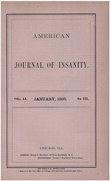Relationship of aggressive behavior to other neuropsychiatric symptoms in patients with Alzheimer's disease
Abstract
OBJECTIVE: This study explored the relationship between aggressive behavior and other neuropsychiatric symptoms in patients with Alzheimer's disease. METHOD: Consecutively assessed outpatients with probable or possible Alzheimer's disease (N = 75) were assessed with the Behavioral Pathology in Alzheimer's Disease Rating Scale and the Hamilton Depression Rating Scale. RESULTS: Twenty-five patients (33%) had verbal outbursts and 13 patients (17%) engaged in physical aggression in the month prior to assessment. Aggressive patients and nonaggressive patients did not differ regarding age, education, gender, level of depression, or severity of dementia. In the entire group, dysphoria was found in 33%, delusional ideation in 39%, and hallucinations in 16%. Aggressive behavior was more frequent among patients with hallucinations than among those without. Scores on hallucinations and activity disturbance predicted 12% of the variance in total aggressive behavior. When data from patients taking psychotropic medication were excluded from the analysis, hallucination and delusion scores predicted 22% of the variance in the aggression score. Physical aggression was associated with activity disturbance and hallucinations, and verbal aggression was associated with delusional ideation. No other clinical correlates of aggression were identified. CONCLUSIONS: Aggressive behavior is a frequent behavioral symptom in Alzheimer's disease. About one-fourth of the variance in aggression could be attributed to psychosis.
Access content
To read the fulltext, please use one of the options below to sign in or purchase access.- Personal login
- Institutional Login
- Sign in via OpenAthens
- Register for access
-
Please login/register if you wish to pair your device and check access availability.
Not a subscriber?
PsychiatryOnline subscription options offer access to the DSM-5 library, books, journals, CME, and patient resources. This all-in-one virtual library provides psychiatrists and mental health professionals with key resources for diagnosis, treatment, research, and professional development.
Need more help? PsychiatryOnline Customer Service may be reached by emailing [email protected] or by calling 800-368-5777 (in the U.S.) or 703-907-7322 (outside the U.S.).



